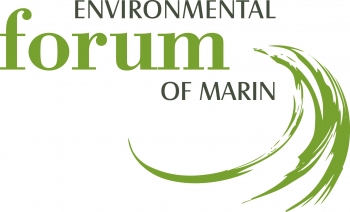In the News
News

Oct 01, 2019
Nonprofit Profile
How to Stop Worrying and Start Doing Something About Climate Change with Environmental Forum of Marin
Oct 01, 2019
By Greg Brockbank
In 1972, a group of stalwart environmentalists intent upon averting a future of unchecked development in Marin County formed Environmental Forum of Marin (EFM). Founder Dr. L. Martin Griffin engaged Phyllis Faber, Nona Dennis, Kathy Cuneo and others to convince decision-makers to protect important agricultural lands and natural ecosystems in the county.
My involvement with EFM began in the late 80s, a time of great societal environmental interest. I’d just graduated from law school and started my practice here. EFM is the only environmental organization in the Bay Area to offer a hands-on, comprehensive program in high-level advocacy training with a focus on issues analyses, actionable strategies and effective communication. Called the Master Class program, I couldn’t resist.
Every week, we learned an incredible amount about Marin’s native flora and fauna, how they came to be the way they are, and the importance of protecting them. The cost was (and still is) quite low, and of course the class members bonded like any school class (Go Class 15!), as we became members of a too-exclusive club of people extremely well-educated in our natural environment. Taught most of each Tuesday for most of the year when I took it (they’ve since shortened the class considerably, and they now have many classes on Saturdays instead of Tuesdays), it entails either sitting in classrooms (at various interesting sites) or traveling via bus to places that ideally all Marinites should have visited and learned about, especially in West Marin, such as the Strauss Dairy Ranch. This participatory, in-field seminar gave us an immense trove of knowledge, along with instructions and experience (an advocacy session) in how to use it to make a difference.
A critical component of the Master Class is the design and completion of a stewardship project. Students select a topic and create a goal-oriented project, either independently or as part of a team, and quite a few are mentored by local leaders and former Master Class graduates. Past projects that have motivated real change include the plastic bag ban in Marin County, the Straws Upon Request project, the Marin Open Garden project, the “deep greening” with MCE power of an additional seven municipalities including the county of Marin, the University of San Francisco’s purchase of Star Route Farms in Bolinas, and an in-depth look at Marin County’s Climate Action Plans. Last month, EFM welcomed its 46th Master Class with keynote speaker Dr. Ellie Cohen, newly appointed CEO of The Climate Center in Santa Rosa and former CEO and President of Point Blue Conservation.
In addition to the Master Class, EFM hosts thought-provoking talks and films year-round. I apparently attended so many of them for a few years that they made me the director of the program, now called the EFM Lecture Series. Recent topics include sea-level rise, land use, transportation and housing, waste and toxins, carbon sequestration, energy efficiency and adaptation strategies to preserve our local ecosystems. Coming up on November 6th is, "Funding Climate Restoration via Philanthropy and Carbon Offsets: Who's Moving the Needle and How Can You Help?" You can register for it here.
Even though EFM has long had only a few hundred members (compared to the thousands of members in the Marin Conservation League and the Sierra Club’s Marin members), because only so many people can gradate from the Master Class each year (although that’s no longer a membership requirement, nearly all members have in fact graduated from the Master Class), it is considered one of the top environmental organizations in Marin because of the level of knowledge of its members. The kind of people who took the class and became members has changed over the years: it used to be mostly housewives who didn’t work during weekdays, and too many of them didn’t become activists, but in recent years (decades, really), its graduates have increasingly become impressive environmental activists and advocates, and sometimes professionals. Their contributions during the class and after they graduate are becoming more impressive each year, judging from the presentations of their class projects and their graduations, which I usually attend.
I’m a firm believer that a major reason we should all do whatever we can now to fight climate change, in addition to saving the planet and future generations from irreparable harm, is to answer our grandchildren when they inevitably ask what we did to avoid the almost-certain environmental catastrophe, and why we didn’t stop it. Taking the Environmental Forum Master Class is an excellent way to learn a great deal about our local environment in a relatively short period of time. I sleep better knowing I have that knowledge and can thus better engage with the innumerable environmental issues of today, not the least of which is climate change and the future of our planet.













